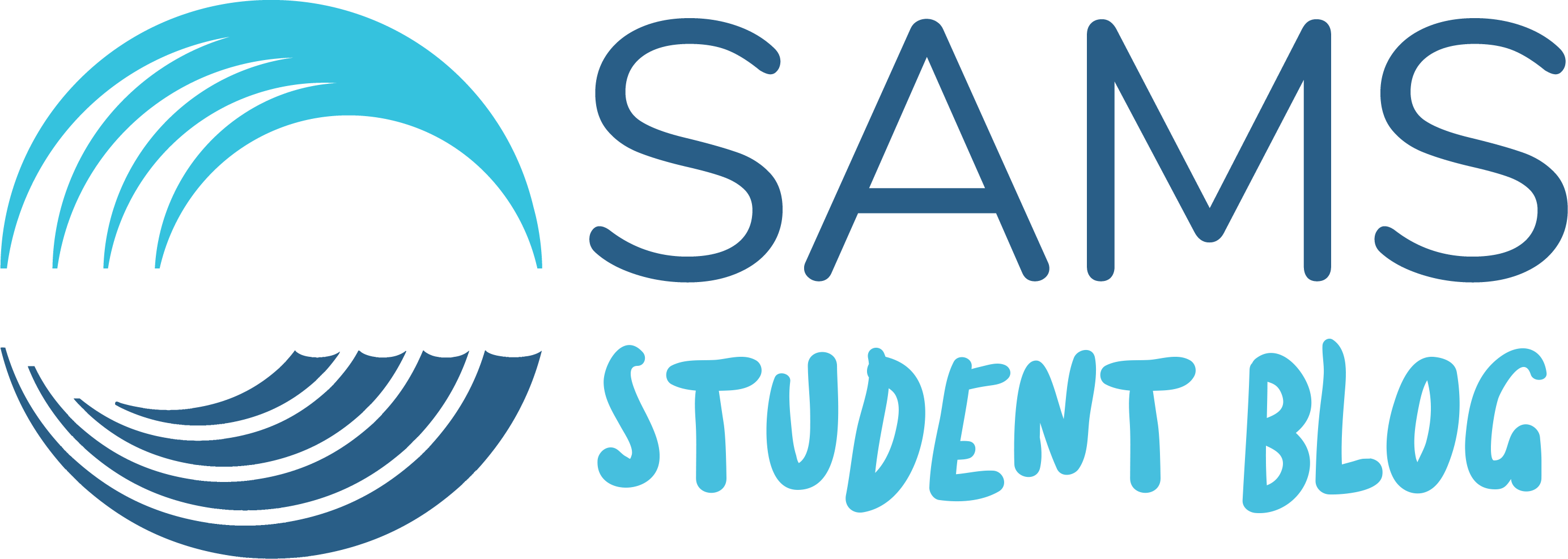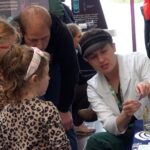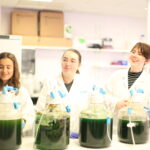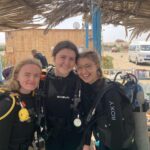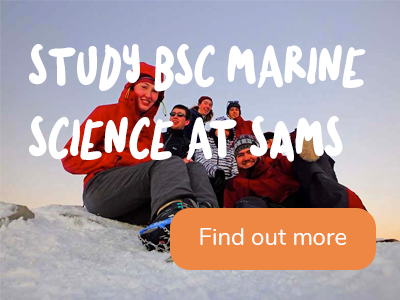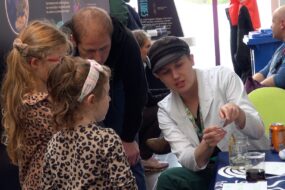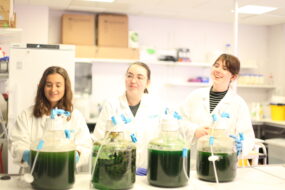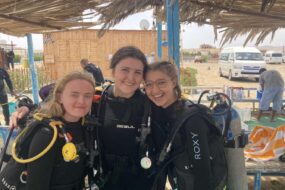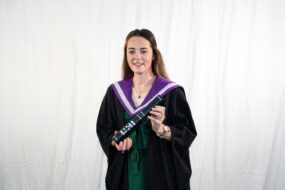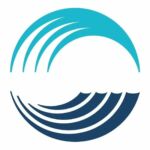SAMS UHI 2017 BSc Marine Science alumni Blair Watson shares his experience of studying marine science here in Oban, what his journey has been like since graduating and how his degree and networks at SAMS helped towards securing his exciting Project Officer position working in marine science outreach and communications at Edinburgh’s Dynamic Earth.
My current job in marine science
I’m working at Edinburgh’s Dynamic Earth, a science museum focussing on the natural world, where I’m the Discovering the Deep Project Officer, a really cool job where I get to help in developing a new oceans-based gallery and activity plan. We’ll be shining a light on Scotland’s deep seas, and our history with regards to marine exploration, focussing on the story of the Challenger expedition, and Charles Wyville Thomson, an often-overlooked figure from Scotland’s past who contributed greatly to the field of marine science. I assist with the research of the new gallery, work with scientists to develop various elements of the interactives, and provide input around the creative direction of the gallery. In addition to this, I’m developing an activity plan to compliment the gallery, working on events to engage a variety of audiences, creating school workshops, developing various activities that allow our visitors to understand the core points of the story in fun and interesting ways, and doing talks based on the content of the new gallery – basically bringing the deep sea to the people!
Why SAMS UHI stood out for me as the uni of my choice
I remember looking around at the various courses, however it was the interdisciplinary nature that really caught my eye at SAMS. For so long, marine biology was the only option that I had considered, but when I found SAMS, I realised that that was just the tip of the iceberg! Life in the sea fascinated me, but then so do the ocean currents, hydrothermal vents, seamounts and marine technology – by going to SAMS I knew that I would have the opportunity to try a variety of fields, and find what felt like a natural fit to myself. Plus, the location of the campus helped make the choice rather easy!
My marine science career inspiration
I grew up in a small coastal community, with some incredible rock pools that I explored frequently with family during the summer. My dad is also a fisherman, so I was incredibly lucky in that I had the opportunity to see first hand some incredible marine creatures that some may go their whole lives without seeing, including dogfish, pipe fish, octopi, sea urchins and much, much more. I remember even getting the chance to drive his boat which was great fun. When your life and the sea are so intertwined, it’s difficult not to feel a sense of connection to it, and an urge to do what you can to help protect this incredible environment, and so to go into marine science felt like a natural choice for me.
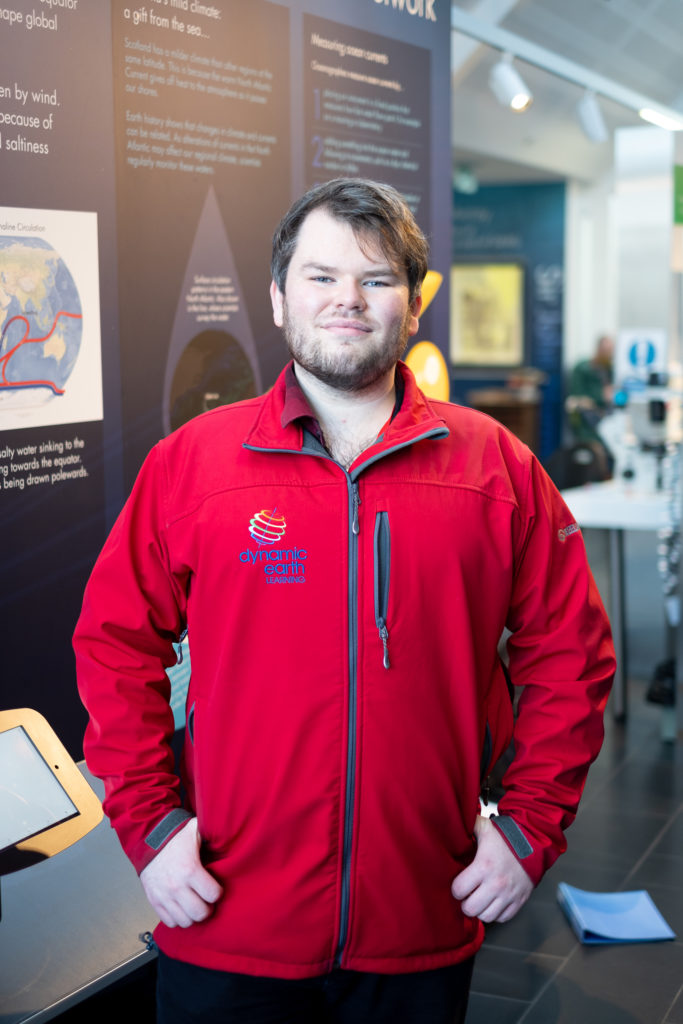
My journey after graduating from the BSc at SAMS UHI
After graduating I stayed at SAMS over the summer to do an internship with ‘Capturing our Coast’, a citizen science project aimed at better understanding the species that live on our coasts. I got a lot of engagement and comms experience here, with my favourite part of the experience running outreach events at SAMS’ Ocean Explorer Centre, which I had a lot of fun doing. After finishing this internship, I headed to Bristol, to do an MSc in Science Communication, studying how to communicate science through journalism and film/radio. This was a great course, with the science communication module at the time run by SAMS giving me a great foundation to build from. I honed my skills in communication, but more importantly, I got to look in depth into why communication is such an important part of the scientific process.
After handing in my dissertation, I began the job hunt, which is never easy when you’re just starting out. It took a few months before I landed my first role in my current field, working as an ‘Information Officer’ for the Marine Conservation Society, where I engaged both the local communities of the North Eastern Highlands, and tourists, in the science being done as part of the Dornoch Environmental Enhancement Project, an oyster restoration scheme. After my contract there ended, I once again was back on the job hunt. During lockdown I was one of the fortunate ones able to get a job back in the field that I had trained for. Thanks to a staff member at SAMS who had suggested I go for the role, I was lucky enough to begin as the STEM Programme Coordinator at the University of the Highlands and Islands Inverness campus, where I once again got to put my science communication skills into action, running teacher training sessions and developing teaching materials in STEM fields. Once again this role had an expiration date, however, through sheer luck, and again thanks to my network I built up at SAMS, I found my next, and current position, which is in fact the job of my dreams!
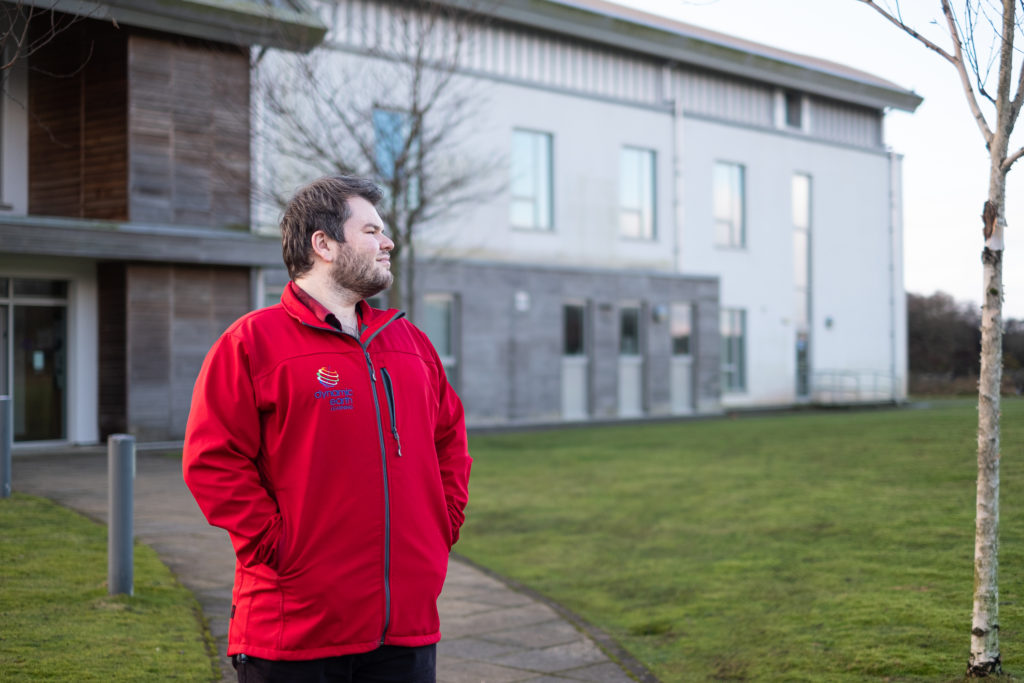
My advice for students on how to improve their employability skills in marine science
Get stuck in, and try things out. Being a student is the perfect time to figure out what really interests you – things may sound good, but you won’t really know until you’ve given it a go, and I can guarantee you that there will always be someone willing to help and encourage you, so do not be afraid to ask to get involved! I would also recommend curating your social media so that you follow members of your particular field(s) of interest. Places like Twitter can actually be a great resource when it comes to looking for opportunities, be it for experience, funding, internships, volunteer roles, or even just to connect with those that you admire in the field.
Career and study highlights so far
Without a shadow of a doubt I would say that the field and practical work were absolute highlights during the SAMS UHI Marine Science BSc course. To head out on the water, feel the sea spray on my face, and investigate our own local waters was an absolute joy, and I would do it all over again in an instant. Additionally, and perhaps a sign of things to come, one of my favourite modules was actually deep-sea science. To learn about this hidden world, and to hear that actually, there is still so much to discover in this part of the world, is actually really exciting!
A career highlight of mine occurred back in November, where for a couple of days I got to work in the Scottish National Museum’s collection centre, flicking through pages of the original reports from the HMS Challenger, over 100 years old, and photographing the most stunning illustrations of the creatures discovered during this remarkable cruise. To have the opportunity to work with such an important and beautiful resource was an absolute privilege.
Most challenging parts of my marine science journey
There were of course modules that I didn’t do as well in when I was at SAMS, and that brought lows, but I persevered, I took what I needed from these classes, and whilst I am by no means an expert, I’m glad I stuck with them, as they have each brought something to my career and made me a better communicator and scientist because of them.
During my 3rd year at SAMS, I unfortunately lost a family member, which was incredibly tough. One of the greatest advantages of SAMS however is that it is a small and tight knit community, and so I was surrounded by friends who cared for me when I needed it most, and for that I am incredibly grateful.
Professionally, trying to get my foot in the door knocked my confidence. I had gaps between jobs, where I really struggled to get an interview, however, it only ever takes one person saying yes, so my advice would always be to build your network, take opportunities as they come, and don’t be afraid to ask for help – there are so many amazing people at SAMS, and in the marine science community in general, who want you to succeed, and who will do what they can to help you do so.
To find out more about beginning your marine science journey at SAMS, on a University of the Highlands and Islands programme, visit www.sams.ac.uk/study.
Recent Post
Student Focus – Artemis Eales: MRes Marine
- 18 December 2024
- 6 min read
Student Focus – Evie Whyte, MSc Algal
- 9 May 2024
- 5 min read
Field Trip Reflection: A First-Year’s Experience of
- 2 May 2024
- 5 min read
